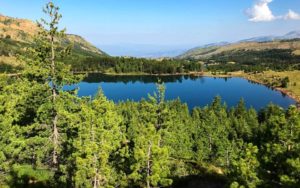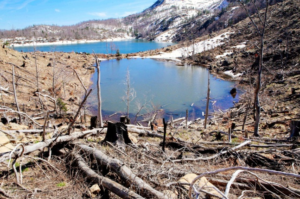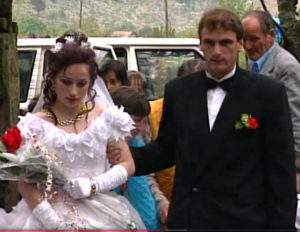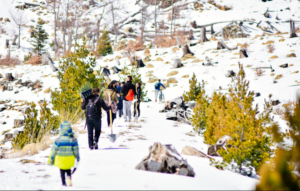By PASS/Ecovolis
Summer 2021 Newsletter
 Once upon a time Lurë was one of the most beautiful pearls of the Balkans. Its 7 lakes were surrounded by Armenian pine from one to five centuries old. This majestic forest — at altitudes of 5000 – 6000 feet, along with hundreds of waterfalls, hundreds of plants and animals, lakes and wildlife — invited visitors from Europe, the Balkans, and all over the country.
Once upon a time Lurë was one of the most beautiful pearls of the Balkans. Its 7 lakes were surrounded by Armenian pine from one to five centuries old. This majestic forest — at altitudes of 5000 – 6000 feet, along with hundreds of waterfalls, hundreds of plants and animals, lakes and wildlife — invited visitors from Europe, the Balkans, and all over the country.
Albanian poet Gjergj Fishta said, “Who has not seen Lurë, has not seen Albania.” Edith Durham, a famous writer on Albania, says that when she arrived in Lurë, the fascinating view amazed her forever.
 With the fall of communism in Albania, a brutal deforestation, similar to a natural holocaust, started in Lurë. People from nearby areas, but who never had lived in or felt connected to Lurë, rushed to plunder it by cutting down hundreds of centuries-old pines.
With the fall of communism in Albania, a brutal deforestation, similar to a natural holocaust, started in Lurë. People from nearby areas, but who never had lived in or felt connected to Lurë, rushed to plunder it by cutting down hundreds of centuries-old pines.
Everyone thought that nature and the park were eternal, but within a few years there were no trees left standing. People couldn’t believe it was gone. Most of them abandoned Lurë, the park, the village, its surrounding nature. The whole ecosystem — wildlife, biodiversity — was destroyed and changed forever.
The inhabitants of Lurë themselves, powerless to protect the park from the illegal gangs, surrendered, joined in the crime against the great natural wealth and beauty around them.
 This is a wedding that took place in 1998 in the village of Lurë where the wedding traditions continued to be preserved. The groom works with wooden forest trunks, while the bride is a teacher from a village near Lurë. After the marriage they and many others left Lurë for a better life in Tirana, but then left Tirana and after 2 years ended up in England.
This is a wedding that took place in 1998 in the village of Lurë where the wedding traditions continued to be preserved. The groom works with wooden forest trunks, while the bride is a teacher from a village near Lurë. After the marriage they and many others left Lurë for a better life in Tirana, but then left Tirana and after 2 years ended up in England.
Lurë was forgotten, abandoned by its inhabitants.
 Twenty-five years later, it was a cold October with Lurë covered in snow, the road not visible. A group of 10 environmental activists from Tirana was visiting to plant young pines and pine seedlings. Some of us were visiting Lurë for the first time, some had been there with their parents when the pines where standing. We stopped when the road got too steep and icy to continue in the vehicles.
Twenty-five years later, it was a cold October with Lurë covered in snow, the road not visible. A group of 10 environmental activists from Tirana was visiting to plant young pines and pine seedlings. Some of us were visiting Lurë for the first time, some had been there with their parents when the pines where standing. We stopped when the road got too steep and icy to continue in the vehicles.
We unloaded 50 3-year-old pine trees and a bunch of seedlings, took our shovels and food, and set off on foot on the road to the lakes.
Destruction surrounded us, cut trees and trunks everywhere, deserts of fallen trees where wildlife once thrived. We felt sadness at every step of our mission through the majestic park, now destroyed.
Very determined upon arriving at the first lake, we quickly dug the first 25 holes. When we had time to rest, we had a look around, and the destruction was enough to get us back to our shovels. We dug the other 25 holes, this time more confident, more determined that we were doing the right thing.
This initiative resonated in Albania, bringing together in a short time thousands of volunteers and shovels, and unprecedented will to undo the destruction by planting thousands of young pines and seedlings. The organization that launched the All For Lurë Initiative was Ecovolis NGO; its core partner that made this possible was Pedals for Progress. Everything so far was made possible by this partnership.
Every week activists from all over Albania went to Lurë to plant the seedlings of hope. Although Lurë was completely devastated, the motive for returning and acting was stronger than the feeling of surrender. It has been 6 years since the seedlings were planted, and Lurë is coming back.
What about people? They are leaving again.
No longer in contact with nature, no longer having a way to secure their livelihood, many have abandoned the land. They leave because they have no job, no way of life in the deep mountain villages. They leave for economic reasons and also for social ones.
The mass abandonment of villages has posed a risk to agriculture. Shepherds are emigrating and the areas around those villages are being destroyed. As in Lurë, the forests have been cut down or burned, and pastures are burning. Biodiversity in many areas near these villages has changed. Hundreds of species have become extinct. The production of food has decreased and the villages are importing more from abroad. Our local food products are missing from our tables.
For now, a hopelessness has gripped these villages, a feeling of impossibility or a wish to leave the area as soon as possible.
The third abandonment of Lurë would be the most devastating, with a new risk of handing over the park to the Hydro Power Plant businesses that want water to supply their turbines.
What if?
Ecovolis and P4P have initiated an activity with the help of bicycles and sewing machines to repopulate abandoned villages in the impoverished north of Albania.
Ecovolis with the support of Pedals for Progress has a plan to organize somewhat differently Lurë’s future: to encourage some of the people to return and to give them hope for a future. We have a plan for the return of a new kind of tourism in Lurë and a return of a traditional skill.
- tent camping by bicycle
- sewing machines to restore the tradition of embroidery
Will we all work together to create a model of hope and enthusiasm in Lurë and beyond. Lurë was a model of natural beauty and usefulness, of work and endurance of the inhabitants. Why not again be a leader in disseminating these values?
